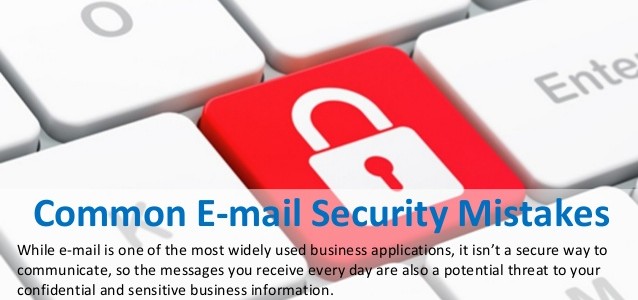10 Common Mistakes In Email Security

10 Common Mistakes In Email Security
The countless PC crashes and a number of spam emails, we had grasped that just opening spam email can harm your computer. Regrettably there are an entire host of traps and faults that attracts new email users just because “they didn’t notice any better”. In this blog we will concentrate on 10 common mistakes in Email Security and how to fix mistakes that anyone can face at anytime. We have written this article basically for new internet user, so if you are an email specialist, you may desire to forward this along to your colleagues or friends.
Using only one e-mail account
Folks who are new to email mainly think about their email account like they do their house address, you only have one residential address, so you should only have one email. Ideally, you should think about your email address like your home keys; while it may be OK to use the same key for your front as well as back door, having a single key to open everything which is not safe and unrealistic. A good email user should keep an atleast 3 email accounts. Your work account should be used primarily for your official conversations. Your second email account should be used for personal works and contacts, and your third email account should be used as general activities which you like.
Holding onto spammed-out accounts
It is directly a fact of life that email accounts will collect spam over a period of time. This is principally true of the account you utilize to sign up for newsletters and that you post. When this occurs, it is good to simply dump the email account and start anew. Regrettably, many new email users get very connected to their email accounts and instead just slop through dozens of sections of spam on a daily basis. To avoid such problem, prepare yourself mentally for the idea that you will have to scrap your ‘catch all’ account every 6 months.
Browser not closing after logging out
When you are examining your email at a library or in cybercafé you not only require to log out of your email when you are done with your things, but you also need to pay attention whether the browser window completely closed or not. Some email services exhibit your username (but not your password) even after you logged out. While the service does this for your benefit, it deals with your email security.
Forgot to delete history, browser cache and passwords
After utilizing a public terminal, it is crucial that you not forget to delete the history, browser cache and passwords. A number of browsers automatically keep track of all the web pages that you have visited and some passwords and personal information that you have enter, so to help you in order to fill out similar forms in the future. If this valuable information falls into the wrong hands, it can lead to theft and stolen bank and email information which is also called as Cyber Crime. It is important that new internet users be aware of how to clear history, browser cache and passwords so that private information cannot be shared by any strangers.
Using unsecure email accounts
Large companies invest huge amounts of money to ensure that their PC or computer networks and email remain secure. Despite their hard efforts, some careless employees utilizing personal email accounts to conduct company business and passes this sensitive data to undermine the security measures in spot.
Forget telephone option
One of the most crucial lessons about email security is that no matter how many initiatives you take to secure your email, it will never be reliable. This is never accurate than when utilizing a public PC. So unless you require a written record of something or are communicating across the world, consider a simple phone call rather than an email option.
Not utilizing Blind Carbon Copy option
When you place a folk’s email addresses in the BCC: rather than the CC: window, not a single recipients can see the addresses of the other email recipients. New email users often depend too much on the TO: because it is the standard way of sending emails. But if you are sending mail out to a various group of people, confusing BCC: and CC: raises some significant privacy and security concerns.
Failing to back up emails
Emails are not just only for chatting, but you can also used it to make legally attaching contracts, conduct professional meetings and major financial decisions. You just have to keep a hard copy of important business and personal documents. Moreover it is salient that you regularly back up your email in order to preserve a record if your email client crashes or loses data suddenly.
Assuming that an erased email is gone forever
We have all sent a humiliating or unfortunate email and relieved when it was finally deleted, thinking the entire episode was behind us. Imagine again. Just because you erase an email message from your inbox and the sender deletes it from their ‘Sent’ inbox that doesn’t mean email is lost forever. In fact, messages that are deleted often still exist in backup folders and can be retrieved by skilled experts.
Failing to encrypt important emails
It is not important how many steps you take to reduce the chance that your email is being tracked by hackers, you should always presume that someone else is observing whatever comes in and out of your PC. Given this presumption, it is important to encrypt your emails so that if someone is tracking your account, at least they can’t comprehend what you are saying.
Leave a Reply